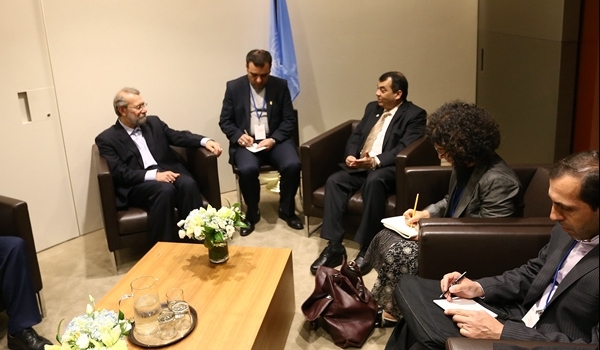Iranian Parliament Speaker Ali Larijani called on the International Inter-Parliamentary Union (IIPU) to adopt an active stance on war on terrorism.
“The International Inter-Parliamentary Union should not play a weak and passive role vis-à-vis the spread of terrorism and extremism as well as a country attacking another country,” Larijani said in a meeting with IIPU Chairman Saber Hussein Chaudhury in New York on Tuesday.
He called for IIPU’s active and constructive role towards important political, social, economic and cultural developments.
The Iranian parliament speaker pointed to the Saudi-led aggression against Yemen and the urgent need of the Arab country to basic needs, and said, “The IIPU should try to alleviate their problems by sending a fact-finding team to the region and studying possible ways for helping the Yemeni people.”
Larijani regretted that if the budget spent on arms aids to the terrorist groups were funneled into plans for the welfare and development of the same countries, there would remain no sign of extremism and terrorism anymore.
In relevant remarks on Monday, Iranian Deputy Foreign Minister Hossein Amir Abdollahian warned against the rise in certain regional countries’ instrumental use of the Takfiri terrorist groups which pose a very great risk to the tranquility and stability of the region.
“Some regional actors make an instrumental use of terrorist groups for the sake of their political objectives,” Amir Abdollahian said in a meeting with Bolivian Deputy Foreign Minister Juan Carlos Alurralde in Tehran.
The Iranian deputy foreign minister pointed to the spread of Takfiri terrorism and extremism in the region and it negative influence on international security, and called for collective efforts to prevent the same.
Amir Abdollahian, meantime, pointed to the upcoming visit of Bolivian President Evo Morales to Tehran to attend a summit meeting of the gas exporting countries, and expressed the hope that the Iran-Bolivia relations will further expand.
The two sides also discussed issues related to Latin America and Asia.
Also in February, Iranian Foreign Minister Mohammad Javad Zarif called for collective efforts by all countries to uproot the Takfiri terrorists in the region, and warned against their rising threats.
“The sooner the international community and particularly our friends in the region come to realize that they cannot even gain short-time benefits from the existence and cooperation with these Takfiri groups, the sooner we can reach a methodology of how to deal with them,” Zarif told reporters on the sidelines of the 51st International Security Meeting in Munich.
The Iranian foreign minister, meantime, regretted that some countries have been cooperating with the Takfiri terrorists to for the sake of political gains.
Washington trying to save ISIL to keep muslims in need of US
 On the other hand, Commander of the Islamic Revolution Guards Corps (IRGC) Quds Force Major General Qassem Soleimani described ISIL as the US protégé, and cautioned that Washington is doing its best to keep the Tafiri terrorist group alive and in power in a bid to use it as a pressure leverage against the Muslim community.
On the other hand, Commander of the Islamic Revolution Guards Corps (IRGC) Quds Force Major General Qassem Soleimani described ISIL as the US protégé, and cautioned that Washington is doing its best to keep the Tafiri terrorist group alive and in power in a bid to use it as a pressure leverage against the Muslim community.
“The US intends to protect the ISIL to make Muslims need the US and it has, in fact, turned it into a leverage (against the Muslims),” Major General Soleimani said, addressing the opening ceremony of the 18th meeting of the Assembly of Experts in Tehran on Tuesday.
He said the ISIL is a US product and protégé, reiterating that the terrorist group has been created by Washington.
Major General Soleimani, meantime, pointed to Yemen’s Ansarullah revolutionary movement, and said, “Ansarullah is a popular movement and current that is supported and accompanied by a large population of the Yemeni people, and although this war (on Yemen) has been even harsher and more powerful than the war on the (Afghan) Taliban, it is now for six months that Ansarullah has been resisting, while the Taliban collapsed in just two months.”
And when it saw the rise to power of the publicly supported movement, it felt deep fear and attacked the Yemeni nation, he said.
The IRGC Quds commander further briefed the Experts Assembly members about the latest conditions in the region, specially in Iraq and Syria, and said that the US strategies have failed in the region due to Iran’s Islamic Revolution.
FNA
R.S

